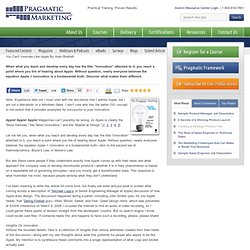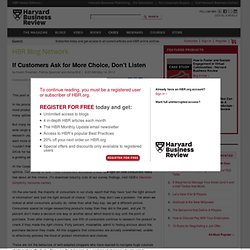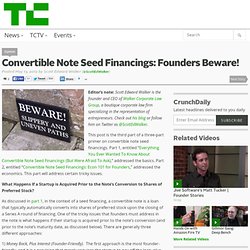

You Can't Innovate Like Apple. Practical Training.

Proven Results. Alumni Resource Center Login 1-800-816-7861 You Can't Innovate Like Apple By Alain Breillatt When what you teach and develop every day has the title “Innovation” attached to it, you reach a point where you tire of hearing about Apple. Rate Note: Experience tells me I must start with the disclaimer that I admire Apple, but I am not a Macaholic or a Windows Geek. Apple! Let me tell you, when what you teach and develop every day has the title “Innovation” attached to it, you reach a point where you tire of hearing about Apple. But ask these same people if they understand exactly how Apple comes up with their ideas and what approach the company uses to develop blockbuster products—whether it is a fluky phenomenon or based on a repeatable set of governing principles—and you mostly get a dumbfounded stare.
Insights On Innovation Helen Walters at BusinessWeek.com summarized Lopp’s panel with five key points: Apple thinks good design is a present. 10 to 3 to 1. If Customers Ask for More Choice, Don't Listen - Karen Freeman, Patrick Spenner and Anna Bird. By Karen Freeman, Patrick Spenner and Anna Bird | 9:20 AM May 14, 2012 This post is the second in a three-part series.

In his provocative book The Paradox of Choice, Barry Schwartz’s warns that giving consumers more product choices actually lowers their purchase satisfaction. Schwartz reasons that having too many options makes us fear missing out, which causes anxiety, analysis paralysis and regret. But many marketers have dismissed Schwartz’s warning, arguing that today’s consumers expect a wide range of options and have learned to filter greater amounts of information. Marketers’ own research usually backs this up. At the Corporate Executive Board, we’ve been exploring purchase behaviors in this world of infinite options. On the one hand, the majority of consumers in our study report that they have “just the right amount of information” and “just the right amount of choice.” And this isn’t just a problem for consumers.
Convertible Note Seed Financings: Founders Beware! Editor’s note: Scott Edward Walker is the founder and CEO of Walker Corporate Law Group, a boutique corporate law firm specializing in the representation of entrepreneurs.

Check out his blog or follow him on Twitter as @ScottEdWalker. This post is the third part of a three-part primer on convertible note seed financings. Part 1, entitled “Everything You Ever Wanted To Know About Convertible Note Seed Financings (But Were Afraid To Ask),” addressed the basics. Part 2, entitled “Convertible Note Seed Financings: Econ 101 for Founders,” addressed the economics. This part will address certain tricky issues. What Happens If a Startup is Acquired Prior to the Note’s Conversion to Shares of Preferred Stock? As discussed in part 1, in the context of a seed financing, a convertible note is a loan that typically automatically converts into shares of preferred stock upon the closing of a Series A round of financing. 1) Money Back, Plus Interest (Founder-Friendly).
This is another tricky issue.